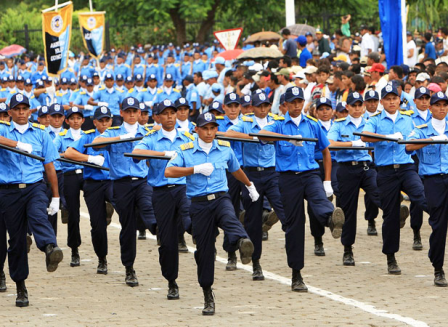A newspaper in violence-plagued Honduras investigated why Nicaragua enjoyed a much lower homicide rate and credited its neighbor’s relatively professional and efficient police force for keeping the peace. But the answer isn’t that simple.
El Heraldo recently traveled to Nicaragua to find out why the homicide rate there is just 8 per 100,000 inhabitants, while Honduras has only recently shed its dubious title as the world’s murder capital. Despite a decline in homicides in recent years, at 57 per 100,000 inhabitants Honduras remains one of the most violent countries in Latin America.
The newspaper attributes Nicaragua’s low levels of violence to the purging and modernization of its police force, which began in the 1990s and continued until 2007. Following the lengthy reform process, Nicaragua implemented a policy that emphasized community policing and violence prevention.
“It is estimated that the [homicide] rate is just 8 per 100,000,” a video accompanying the article reads. “That is thanks to the ‘Preventive, Proactive and Community’ police model.”
Some 79 percent of the population approves of the police force, according to official statistics cited by El Heraldo, and under 5 percent of Nicaraguans consider crime to be the country’s biggest problem. In contrast, 48 percent of all Hondurans surveyed in December 2015 said they have no confidence whatsoever in the police. (pdf)
El Heraldo states Honduras should “follow these steps” in order to improve its own security situation. It noted that this process is already underway, with the creation of a new commission to purge the civil police force of corrupt officers. The police reform commission recently presented to Honduras’ Attorney General’s Office cases against 455 officers accused of involvement in illicit activity.
InSight Crime Analysis
Police reform is undoubtedly a key element to Nicaragua’s security success relative to its neighbors like Honduras. And building off the police reform commission’s achievements thus far in Honduras will be vital if the authorities hope to clean up a force that has long been plagued by corruption.
SEE ALSO: Coverage of Police Reform
But El Heraldo’s narrow focus on police reform underestimates the role of criminal actors in influencing homicide rates. Criminal pacts in El Salvador and Colombia have shown that agreements between key underworld players can have as big or bigger an impact on insecurity than any government strategy.
In other words, effective policing is only one side of the story. The violent street gangs and drug trafficking organizations that pervade Honduras are largely absent in Nicaragua. To understand the contrasting security fortunes in Nicaragua and Honduras, the criminal disparity must be considered alongside the disparity in the quality of the two countries’ police forces.
Vanda Felbab-Brown, a senior fellow at the Brookings Institution, noted in September 2015 the difficulty of separating the respective impact that policing and organized crime have on violence levels.
.@InSightCrime Raises old Q: Was violent in Costa Rica & Nicaragua absent bc good policing or because drug routes didn’t go through there.
— Vanda Felbab-Brown (@VFelbabBrown) September 24, 2015

